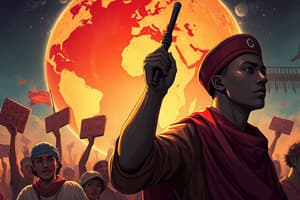Podcast
Questions and Answers
देश की आजादी की मुख्य वजह क्या थी?
देश की आजादी की मुख्य वजह क्या थी?
- दूसरे विश्व युद्ध का अंत (correct)
- अमेरिका का समर्थन
- कम्युनिज्म का प्रसार
- यूरोपीय शक्तियों की कमजोरी
किस देश ने अपने स्वतंत्रता संग्राम में अमेरिका से प्रेरणा ली?
किस देश ने अपने स्वतंत्रता संग्राम में अमेरिका से प्रेरणा ली?
- कुवैत
- इराक
- भारत (correct)
- चीन
अमेरिकी सक्रिय कार्यकर्ताओं ने किस आंदोलन का समर्थन किया?
अमेरिकी सक्रिय कार्यकर्ताओं ने किस आंदोलन का समर्थन किया?
- नस्लीय समानता आंदोलन (correct)
- मजदूर आंदोलन
- प्रजातांत्रिक आंदोलन
- महिला आंदोलन
Which one of these is the most correct?
Which one of these is the most correct?
शीत युद्ध संदर्भ में अमेरिका ने किन देशों का समर्थन किया?
शीत युद्ध संदर्भ में अमेरिका ने किन देशों का समर्थन किया?
नवीन स्वतंत्र देशों के सामने क्या चुनौतियाँ थीं?
नवीन स्वतंत्र देशों के सामने क्या चुनौतियाँ थीं?
Another question?
Another question?
One more question?
One more question?
Flashcards are hidden until you start studying
Study Notes
History: Globalization, Civil Rights Movement, World War II, Cold War, Decolonization
Globalization Post World War II
After the devastation of World War II, the United States emerged as a dominant global power. The country's leaders sought to prevent another world war and counter the spread of communism by promoting economic stability and global political cooperation through initiatives like the Marshall Plan. This plan aimed to stimulate Europe's economy and create new markets for American goods, which in turn helped establish the US as both an economic and cultural leader on the international stage.
The postwar era saw the rise of consumer societies across the United States, with a burgeoning middle class eagerly purchasing products such as cars and televisions. This prosperity not only transformed daily life within the US but also solidified its position as a leading player in global politics and economics. The United States also played a significant role in the establishment of international organizations like the United Nations, becoming one of its most influential members.
Civil Rights Movement and Decolonization during the Cold War
The global power dynamics following World War II also influenced civil rights struggles within the US. During this period, African Americans and other marginalized groups sought to end racial discrimination and achieve equality. These efforts were intertwined with decolonization movements across Asia and Africa, as leaders from these regions often looked to the US for inspiration and guidance in their own struggles against colonialism and oppression.
Some American activists recognized the connection between their domestic struggle for civil rights and the broader global movement toward self-determination. They advocated for a world where all people could live free from oppression, regardless of race or nationality. This included traveling abroad to meet with leaders from newly independent nations and supporting anti-colonial movements around the globe.
However, the Cold War context complicated these relationships. The desire to counteract Soviet influence sometimes led the US to support authoritarian regimes that were not necessarily democratic. In addition, some newly independent nations faced challenges related to their colonial past, such as economic instability and political strife, which further complicated relations with Western powers like the US.
World War II and Decolonization
The end of World War II marked the beginning of the decolonization process in Asia and Africa. Between 1945 and 1960, over three dozen new states achieved independence from European colonial rulers. Decolonization occurred through various means, including peaceful and orderly processes, protracted revolutions, or military conflicts. The creation of these new nations had significant implications for international relations and the geopolitical landscape, particularly due to their strategic locations, natural resources, and economic disparities.
The process of decolonization was often influenced by superpower competition during the Cold War era. Some newly independent countries became vocal advocates for continued decolonization within the United Nations, pushing for greater self-governance and challenging European colonial claims. This added complexity to the US position, as it sought to support national self-determination while maintaining strong ties with its European allies.
Cold War and World War II Legacies
The legacies of both World War II and the subsequent Cold War continue to shape global politics today. These historical events have left indelible marks on international relationships, geopolitics, and human rights movements. Understanding these periods requires examining not only the major conflicts and power shifts but also the nuanced interplay between ideologies, economic systems, and civil society struggles.
In conclusion, history encompasses a complex web of global interactions that include economic expansion, political upheaval, civil rights movements, and decolonization efforts. By studying these interconnected phenomena, we can better comprehend how our world has evolved over time and how the past continues to influence the present and future.
Studying That Suits You
Use AI to generate personalized quizzes and flashcards to suit your learning preferences.




